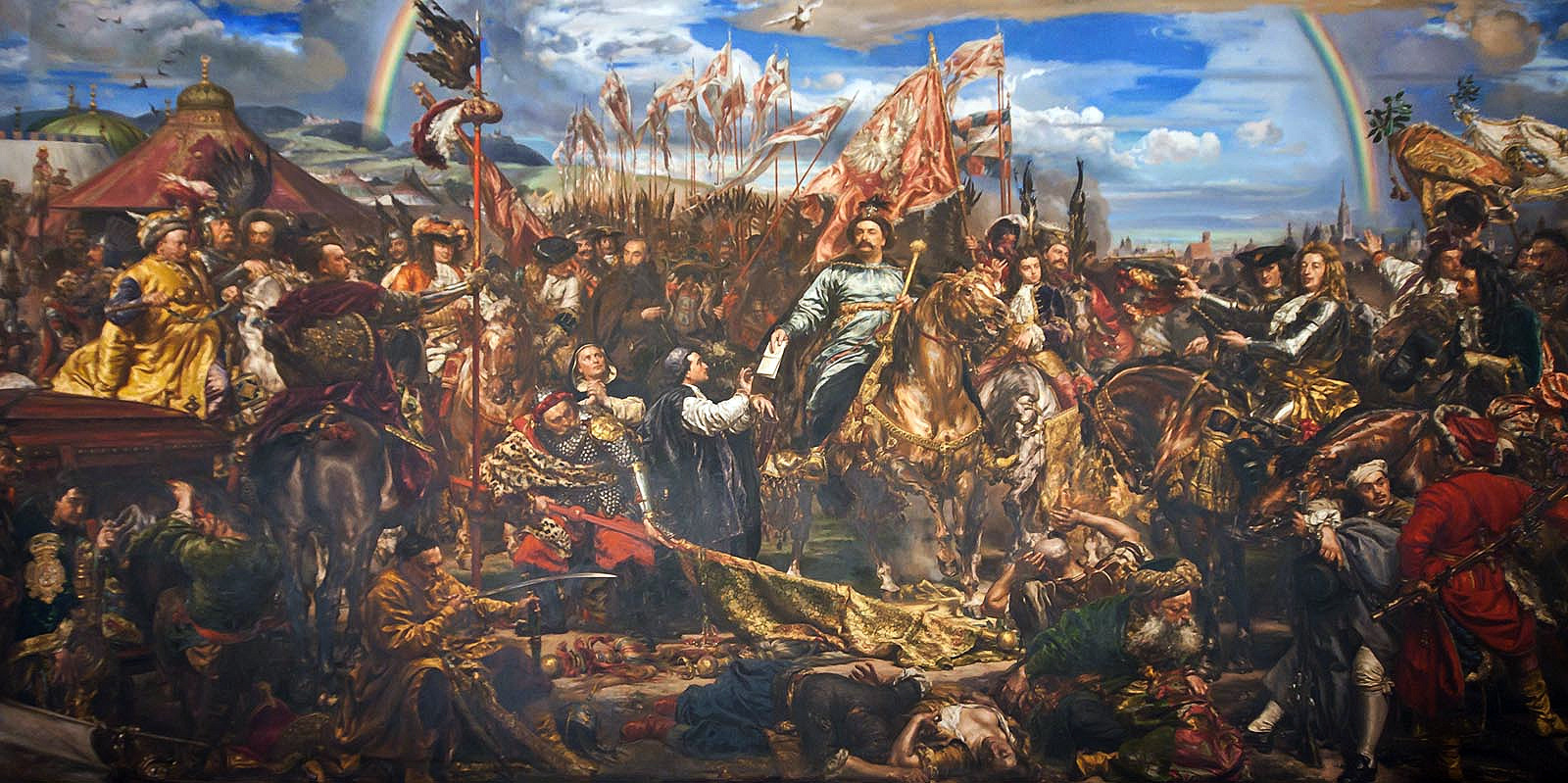%2B-%2BKing_John_III_Sobieski.jpg) |
| Victorious King Jan III Sobieski dictating his famous letter to the Pope and Kings of Europe. Vienna, September 11, 1683 |
Major role in this battle was played by Polish "Winged Hussars", whose unexpected attack - lasting merely half an hour - completely destroyed overwhelmingly larger Muslim forces, and took their camp by storm. Muslims, including the vizier Kara Mustapha, fled in panic, and Polish and Allied troops took the whole rich Turkish camp, and even a few nearby harems left to their fate by Ottoman Empire's soldiers fleeing in droves.
%2B-%2Bwojsko%2Bpolskie%2Bpod%2BWiedniem.jpg) |
| Arrival of King Jan III Sobieski and Polish Winged Hussars |
The very same evening, at the lush confinments of vizir's regal tent, King Jan III Sobieski wrote the famous letter to pope Innocent XI and other European kings: "Venimus, vidimus: Deus vincit" (We came, we saw: God won"). It was very suiting and apropraite to his victory paraphrase of words of other famous victorious commander - Julius Caesar, who wrote to the Senate in Rome after his swift victory over Persian forces in 46 B.C. just 3 words: "Veni, vidi, vici" (I came, I saw, I won).
Just 89 years later the same Austria saved by Poland from obliteration, along with Germany and Russia, have conspired and participated in partitions of Poland, leading to disappearance of the Polish state for more than a century. It was fully acknowledge by all world countries without any fuss... with a notable exception: The Ottoman Empire. It was Turkey who became the last and only country in the world to never recognize the partitions and disappearance of Poland until She was resurrected 100 years later...

© DeS
(Digitale Scriptor)
September 10th, 2001 / "Polish Voice Weekly" #37/2001
tekst za tłumaczeniem na j.polski: Ostatnia wojna z Muzułmanami?
(Digitale Scriptor)
September 10th, 2001 / "Polish Voice Weekly" #37/2001
tekst za tłumaczeniem na j.polski: Ostatnia wojna z Muzułmanami?
P.S.
After the third and final partition of Poland, after which Poland ceased to exist in 1795, the Turkish (Ottoman) Sultan forbade removal of the Polish Embassy. He order it to be officially closed and locked, and the key was stored in the Sultan's vault. When Poland regained her independence century later, the last Sultan of Turkey had the same key returned to the newly appointed Ambassador of Second Polish Republic upon his arrival...
Also during non-existence of Poland, when Sultan's Court issued official banquets and formal dinners for ambassadors and foreign officials, there was always one empty chair intentionally left for the missing Ambassador of non-existing Poland. Once everyone had sat down at the table, the Sultan himself then - despite the rage and protests from ambassadors of Austro-Hungary, Germany and Russia - used to ask loudly the same question: "And where is the Ambassador of Lechistan?"
("Lechistan" was ancient and medieval name of Poland in Turkish; similarily, the Turks used to call King Jan III Sobieski "The Lion of Lechistan").
P.P.S.
Also Iran (then known as Persia) have placed official complaints to ambassadors of Austria, Germany and Russia against partition, dissolution and wrongdoing of Poland by her neighbors. Iran and Turkey were the only two countries in the world to not recognize Partitions of Poland. Several years later, seeking truce with Russia, Persia was forced by Tsar to recognize the status quo, however Ottoman Empire until it's own end have never recognized it.
When Ottoman Empire collapsed and transitioned into Republic between 1920-1922, the newly-resurrected Republic of Poland was one of the first, if not the very first country in the world (accounts wary) to recognize the new Turkish State. Ambassador of Poland was one of the very first to present his diplomatic credentials to the new governments of General Assembly and later the first Turkish President, Mustafa Kemal Atatürk.
Even though Poland have put the stop to growth and expansion of Ottoman Empire in 1683 (after the defeat at Vienna the Empire was never the same - but so was the Republic of Poland), the relations between both countries have always been very friendly, and exchange of art and commerce between those nations have always flourished since antiquity (the so-called "Amber Road" led from Persia to Poland). This everlasting trade had a lot of influence on i.e. Polish traditional clothing, which always had some Eastern elements, as well as on famous Polish Saber (and by extension the Polish Winged Hussars' sabers), which is quite similarly curved to the sabers used in the East by Ottomans and Persians (furthermore, Poles have always similarly frowned upon i.e. rapiers and other Western type of white weapons, often calling those "an oversized cutlery" or "French dandy boys toys").
Perhaps it is easier to understand Polish fascinations with the East knowing that Poles describe and consider themselves the direct descendants of ancient Sarmatians - the people who moved to Europe from the area of what is now Turkey and Iran, but that is yet another story for another article...
Wikipedia - Battle of Vienna (English)
%2B-%2Batak-husarii1.jpg) |
| Attack of Polish Winged Hussars |
%2B-%2BObrona.jpg) |
| Defense of Vienna |
%2B-%2BPowr%C3%B3t%2Bz%2BWiednia%2B(Brandt).jpg) |
| Polish troops returning home with spoils of war and captives |
%2B-%2B1983%2BTablica.jpg) |
| Memorial plaque erected atop Kahlenberg mountain |
%2B-%2B1983%2BTablica02.jpg) |
| Memorial plaque in Vienna issued in 1983 |
Text updated in August 2009 by the Author.
MATERIAŁY PRZYWRÓCONE Z KOPII ZAPASOWYCH, Z TEGO POWODU ORYGINALNY FORMAT MOŻE NIE PASOWAĆ DO FORMATU OBECNEGO BLOGU. NIEKTÓRE ILUSTRACJE MOGĄ BYĆ OBECNIE NIEDOSTĘPNE, A LINKI MOGĄ BYĆ NIEAKTUALNE.

Great read! Thanks! Anyone knows what happened to those harems? ;-)
OdpowiedzUsuńBut seriously, nowadays we need another Lion of Leccistan ASAP...